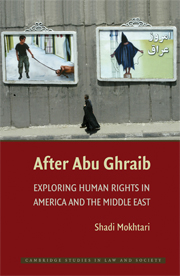Book contents
- Frontmatter
- Contents
- Acknowledgments
- Abbreviations
- Introduction
- ONE American Imaginings of Human Rights and the Middle East
- TWO The Human Rights Challenge from Within
- THREE The Middle Eastern Gaze on American Human Rights Commitments
- FOUR American Imprints and the Middle East's New Human Rights Landscape
- FIVE From the Ashes of the Post–September 11th Era: Lessons for the Human Rights Project
- Conclusion
- Bibliography
- Index
- CAMBRIDGE STUDIES IN LAW AND SOCIETY
- Frontmatter
- Contents
- Acknowledgments
- Abbreviations
- Introduction
- ONE American Imaginings of Human Rights and the Middle East
- TWO The Human Rights Challenge from Within
- THREE The Middle Eastern Gaze on American Human Rights Commitments
- FOUR American Imprints and the Middle East's New Human Rights Landscape
- FIVE From the Ashes of the Post–September 11th Era: Lessons for the Human Rights Project
- Conclusion
- Bibliography
- Index
- CAMBRIDGE STUDIES IN LAW AND SOCIETY
Summary
It is difficult to give a semblance of coherence to the storm of human rights contests that have raged in the post–September 11th era. The era's human rights story was one of glaring failings, formidable challenges, unending contradictions, unprecedented mobilizations, and new opportunities – all unfolding simultaneously. The deluge of stunning human rights developments came in such rapid succession and in such sheer volume that throughout most of the era advocates would leave one crisis only to tend to the next. There was virtually no time to step back and take a broader view of all that had transpired – the winding and crossing paths taken by American and Middle Eastern forces, the ground forfeited and ground gained, and the interconnections between actors and actions traditionally viewed as standing worlds apart. The juxtaposition of three key human rights struggles of the era provides the opportunity for precisely such a global view and pause for reflection.
Most visibly, the era stood stained by its array of human rights violations – renditions to torture, sexual humiliation, hoods, dogs, cages, sensory deprivation, waterboarding, black sites, indefinite detentions without trial, patent racial and religious inscriptions, legal memos justifying and political rhetoric euphemizing torture, categories invoking rights-based rationales to justify the withholding of rights, and military air strikes made in the name of furthering rights and freedom.
- Type
- Chapter
- Information
- After Abu GhraibExploring Human Rights in America and the Middle East, pp. 237 - 244Publisher: Cambridge University PressPrint publication year: 2009



